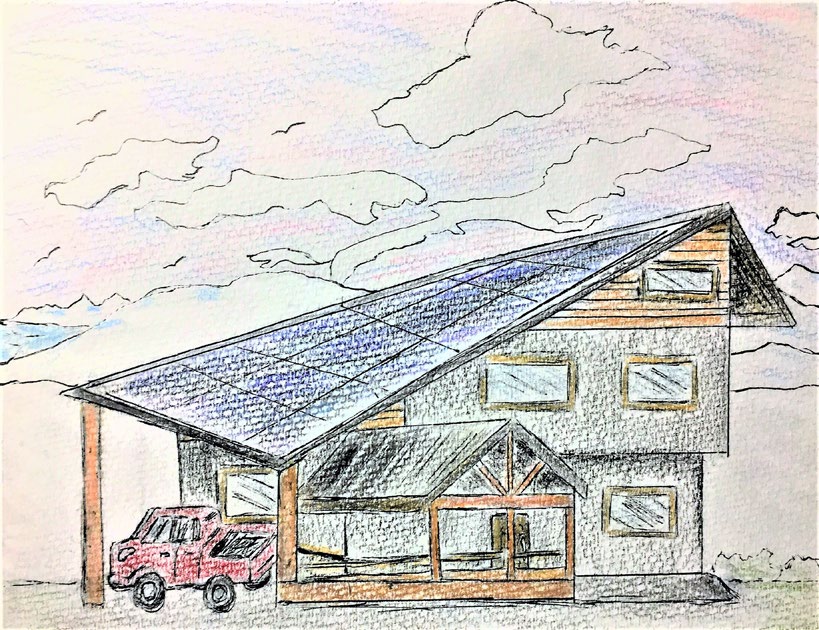UAF Design Team Finalist in DOE’s Solar Decathlon

Designing a home for a remote Alaska community must take a lot into consideration. Including the community itself in the design phase and making sure the home is cost effective, environmentally suitable and energy efficient are important. Designing it as part of an international competition with multidisciplinary team members, none of whom is an engineer or architect, adds a whole other challenge.
A team from University of Alaska Fairbanks is doing just that. The team is one of 10 finalists in the U.S. Department of Energy Solar Decathlon 2022 New Housing Division of the Design Challenge. They competed against 25 teams in their division.
The competition seeks solutions for real-world issues in the building industry. It also builds a community of professionals dedicated to using building design to solve problems related to climate change, affordability and environmental justice.
Teams have the option to compete in either a design or build challenge. Over 80 collegiate teams entered the competition in six divisions.
The UAF team is Alaska’s first in the 20-year competition, and the members are all women (making this announcement very timely, considering March is National Women’s History Month). The team is made up of four students from the UAF Bristol Bay Campus sustainable energy occupational endorsement program.
As in a true decathlon, teams are judged by performance in 10 areas. These include architecture, engineering, market analysis, durability and resilience, embodied environmental impact, integrated performance, occupant experience, comfort and environmental quality, energy performance, and presentation.
The UAF team, mentored by UAF BBC sustainable energy instructor Mark Masteller, is designing a home for the Village of Solomon, near Nome. The Village of Solomon, a tribal government, has been working hard since 2001 to develop and start to implement its local economic development plan. Deilah Johnson, an employee and energy and community champion for the community, is part of the team. She graduated from the sustainable energy endorsement program in 2019 and signed up again to enter this competition.
Initially, Johnson balked at the idea of registering for the class again but did so at the request and encouragement of Masteller. The Village of Solomon has been working on implementing an affordable housing program and, with the assistance of American Rescue Plan Act funding, was able to purchase land in Nome.
“The idea of building new [homes] really aligned well with this kind of a project,” said Johnson.
It was up to the team which category of competition to enter; they chose new housing with support from the tribe and community council.
Johnson is joined by fellow sustainable energy students Amanda Toerdal of Kawerak (the regional nonprofit organization for the Bering Straits Native Association), UAF ethnobotany and psychology student Aihs Palmer, and UAF biology and sustainable agriculture student Meg Waite.
The team initially included five male students from UAF. They dropped out due to various obstacles, including those created by the COVID-19 pandemic. Lacking any engineering students also created a challenge. The women remained and have created a cohesive team working on the common goal.
“Mark has been so encouraging. This team has really focused on communicating,” said Waite. “Coming from different disciplines, different work experiences, different life experiences, it has been some of the most challenging but also some of the most rewarding group work I have ever done.”
Johnson and Toerdal are also members of the Arctic Remote Energy Networks Academy 2022 cohort, a knowledge-sharing program for isolated communities. The program, a partnership between Canada, Gwich’in Council International, the United States and Iceland, is endorsed by the Sustainable Development Working Group of the Arctic Council.
UAF’s team is designing a home that uses locally available materials, including shipping containers, rooftop solar panels, air-source heat pumps, backup heating and electricity. Village of Solomon community and tribal members provide design advice.
UAF is not alone in the decathlon. The University of Alaska Anchorage has a team mentored by Getu Hailu, associate professor of mechanical engineering. That team has entered the build challenge to design, build and operate functional homes in their region.
The finalist teams were chosen based on presentations and design submissions at the semifinal competition event, held virtually Feb. 25-26, 2022. During this event, teams pitched their unique building designs, impressing industry expert jurors with their creativity and ability to tackle the most difficult issues in the built environment.
Up to 10 teams per division were selected as finalists, with divisions including residential and commercial building types in the categories of new housing, retrofit housing, attached housing, multifamily building, office building and education building.
The UAF team has a lot of work to do and will be seeking engineering and architect input before their final presentation in April 2022.
For more information on this team and their project, please contact Aihs Palmer at rapalmer3@alaska.edu.
A diagram of the Village of Solomon home design by Meg Waite.


